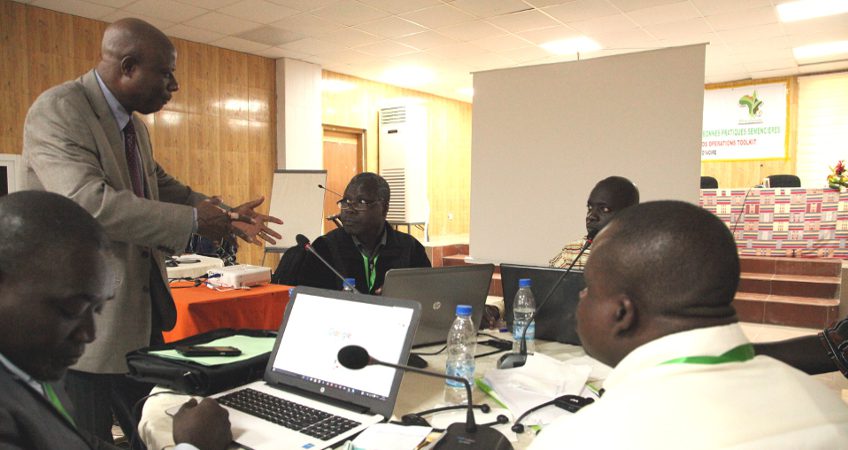On 20 and 21 November 2017, AfricaSeeds and the Food and Agriculture Organization (FAO) gathered representatives from 12 African countries in Abidjan to validate a newly developed set of tools to improve seed operations.
“The mandate of AfricaSeeds as Implementer and Coordinator of the African Union seed program, i.e. the African Seed and Biotechnology Program (ASBP) enjoins us to act as partners to all seed sector actors in Africa”, said AfricaSeeds’ Executive Director, Dr Kouame Miezan, in his opening speech. “I am particularly happy to see the coming together of this array of seed experts from various seed programs and initiatives, as this attests to a healthy future of collaboration needed for a successful development of the seed sector in Africa”, he added.
This workshop is the second step of the validation process of the AfricaSeeds-FAO Seed Operations Toolkit, a guide covering the essentials of seed value chain development. The first validation was held in Abidjan last year, from 14 to 18 November 2016, involving seed experts from 21 African countries. Four of the seven modules of the Toolkit were validated during the first workshop. The topics discussed were small-scale seed enterprises, seed processing, seed quality assurance, as well as seed sector regulation.
During this years’ workshop, the modules validated were about issues not covered by the first workshop, i.e. seed legislation, seed storage and seed marketing. Participants were challenged to analyse the content of each of the three modules and express their comments and views about the relevance and accuracy of the issues discussed. A special attention was given to in-country specificities and challenges.
Legislation to enable sector development
The growing need to revamp national seed laws was acknowledged by all participants. The specificities of the African context, the alignment of seed legislation with seed policy and the update of the laws following international/regional standards were all elements which were debated and clarified.
Overall, the participants agreed that, alongside with adequate policies, legislative aspects should enable seed sector development and facilitate the use of biodiversity in accordance with continental and national objectives of agricultural transformation. They also expressed the need to pay equal attention to both formal and informal seed systems.
Storage techniques adequate to local challenges
In developing countries, it is estimated that more than one third of seeds produced are lost each year during storage, with significant effects on agricultural efficiency and ultimately food security.
Participants went through all challenges that producers face when storing seeds, from the environmental aspects, to pest control techniques, up to economic considerations.
Emphasis was given to understanding how the seed and its internal biological-physiological-biochemical processes function and interact with the surrounding environment in order to minimize losses as a strategy for more effective storage, rather than pointing at costly infrastructures that involve capital intense interventions. Hence the critical importance of building capacity among seed operators about innovative and knowledge intense solutions.
Better informed marketing decisions
High price of seeds, lack of a guarantee of quality and limited access to information are all factors that result in insignificant purchase by ordinary farmers of seeds, especially for self-pollinated crops.
Participants agreed that actions should be taken to develop more astute and better informed marketing decisions that, coupled with good practices and quality control, can enhance sales and improve profitability. Most seed industries in developing countries are however in early stages, and as seed markets and enterprises expand, these industries will need to progressively apply marketing principles to have competitive advantage, meet farmers’ needs and manage the numerous risks they face every day.
Overall, participants were satisfied about the contents of the modules. Their contributions will be incorporated into the revised version of the Toolkit in the following few months. In conclusion, participants recognized the Toolkit should be widely used and its practices adopted to ensure sustainable seed sector development in Africa.
Access some of the pictures and videos of the Workshop through our Flickr and YouTube channels.
